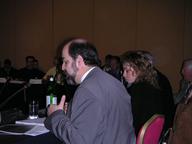No Anonymity or End-To-End in Rome.
 I'm at the ICANN meetings in Rome, and it seems like this is a bad place for anonymity, and, for that matter, the end-to-end Internet. Not only do you have to present a photo ID when purchasing a pre-paid GSM card (+39-3394227447) -- access to the wireless network at the meeting is also designed to prevent anonymous access to communications from happening. Standard at ICANN meetings (delivered by organizers even in China and Tunisia) is open Wi-Fi, with routed IP addresses and fully transparent access. In Italy, we're told, that can't be provided because of some obscure law, so we get individual user IDs and passwords for logging into a 10.* network that's hidden behind a NAT box and a couple of more or less transparent proxies that get into peoples' way when, for instance, securely connecting to a home mail server, and inject silly service provider logos while surfing the web.
I'm at the ICANN meetings in Rome, and it seems like this is a bad place for anonymity, and, for that matter, the end-to-end Internet. Not only do you have to present a photo ID when purchasing a pre-paid GSM card (+39-3394227447) -- access to the wireless network at the meeting is also designed to prevent anonymous access to communications from happening. Standard at ICANN meetings (delivered by organizers even in China and Tunisia) is open Wi-Fi, with routed IP addresses and fully transparent access. In Italy, we're told, that can't be provided because of some obscure law, so we get individual user IDs and passwords for logging into a 10.* network that's hidden behind a NAT box and a couple of more or less transparent proxies that get into peoples' way when, for instance, securely connecting to a home mail server, and inject silly service provider logos while surfing the web.
Security scanning devices photo taken in Vatican yesterday, where airport-like screening is applied to visitors to St. Peter's cathedral; more tourist photos here.
Update, Monday morning: Network connectivity looks much more transparent now.

